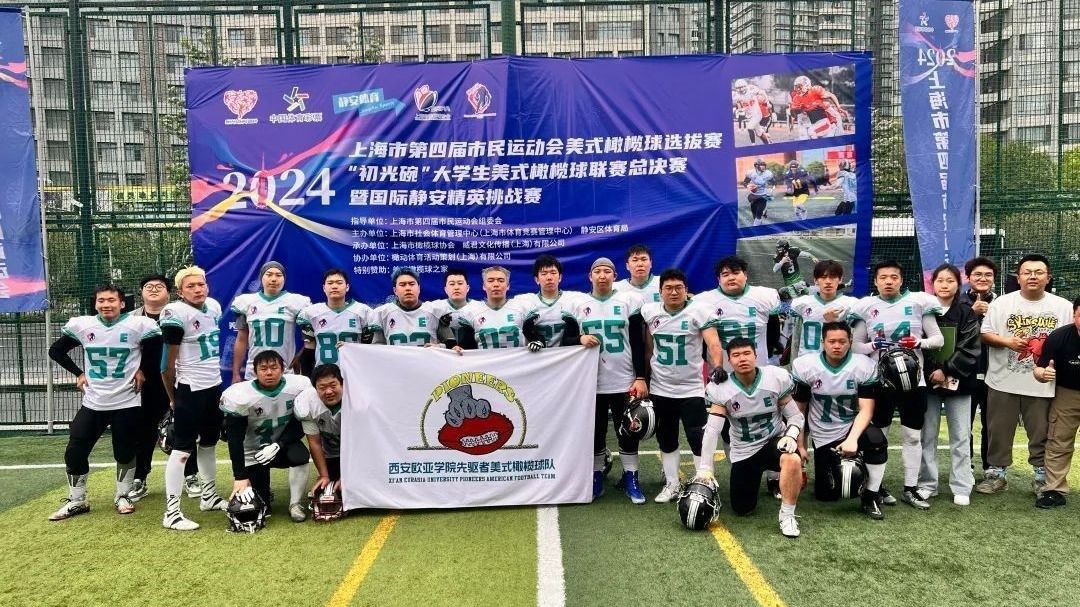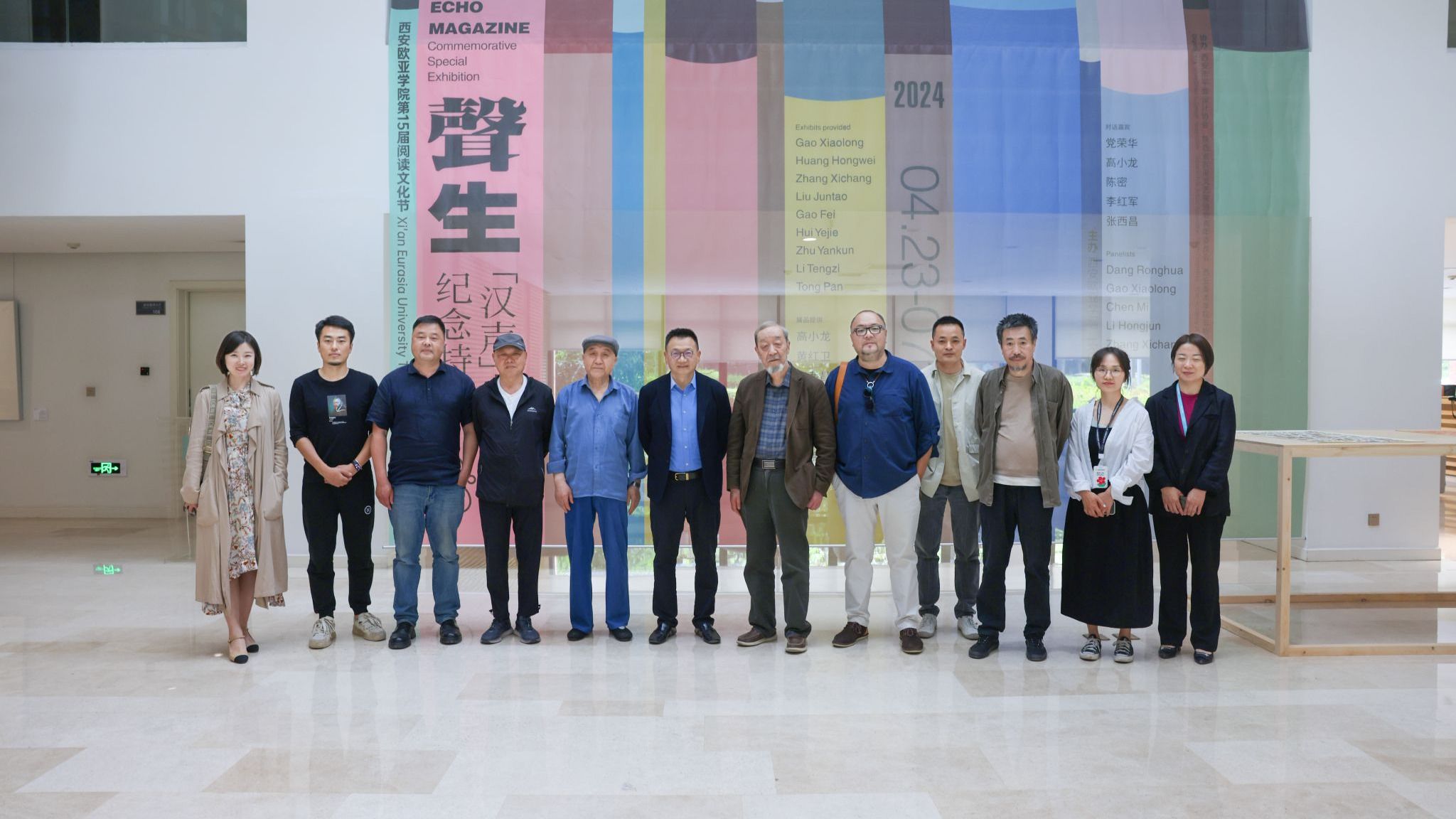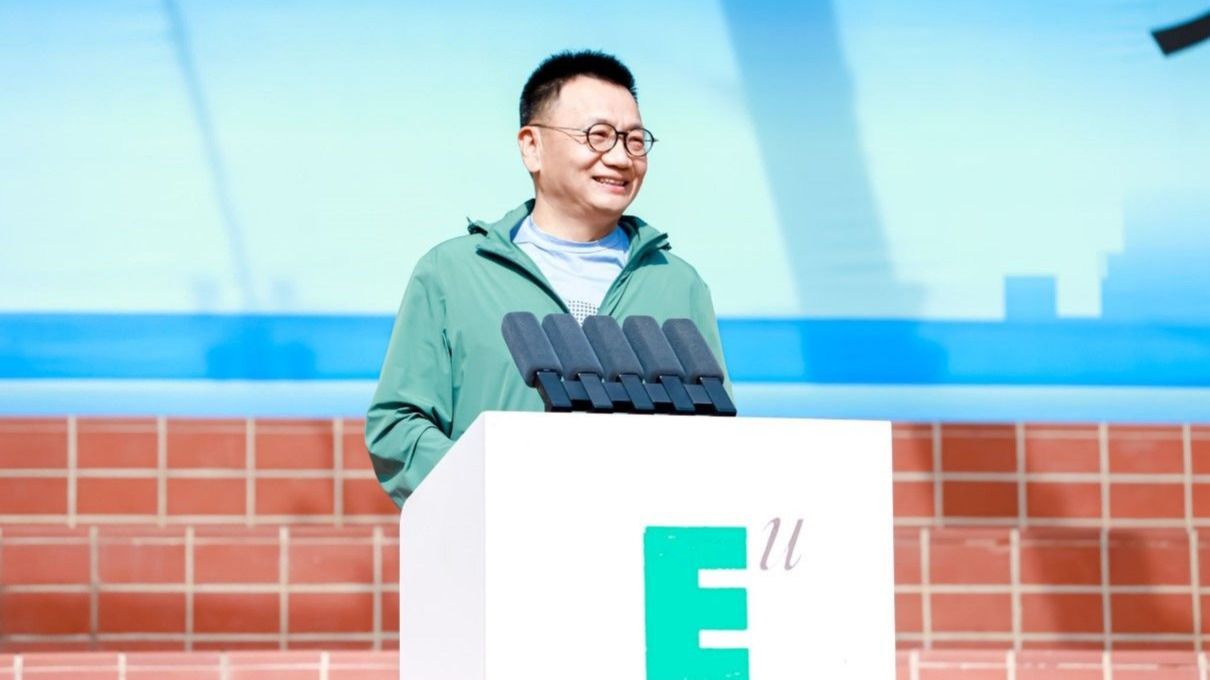
(Fig. 1) Hu Jianbo, Chairman of Xi'an Eurasia University, Liu Jin, principal of the school, Yu Mengchen, Secretary of the Party Committee of the school, and representatives of six research institutes at the opening ceremony
Deepen industry-education integration and promote open education. On November 24, Xi'an Eurasia University held a press conference and press briefing on the establishment of six research institutes. The six research institutes—Institute of Eurasia Education and Innovation, Quality Management Institute, Institute of Urban Organic Renewal, Digital Research Institute, Institute of Culture and Brand Development, and Institute of Property Research Institute—made an appearance. In the future, Xi'an Eurasia University will stimulate stronger vitality of schooling through scientific research and social services, contribute more talent and power to deeper integration into regional economic and social development, and achieve long-term development through opening up.
Hu Jianbo, Chairman of Xi'an Eurasia University, Liu Jin, principal of the university, Yu Mengchen, Secretary of the Party Committee of the university, heads of schools and functional departments, representatives of enterprises and social organizations such as Microsoft China, iFLYTEK, Western Movie Group, Xi'an International Design Center, Xi'an Graphic Design Association, and Xi'an Intangible Cultural Heritage Protection Association attended the press conference. Representatives of more than 30 provincial media agencies, including Xinhua News Agency, China Daily, China Education News, Shaanxi Daily, Chinese Business View, and Shaanxi Broadcasting Corporation, were invited to attend the conference. The conference was hosted by Wang Yan, assistant to the principal.

(Fig. 2) Address by Liu Jin, Principal of Xi'an Eurasia University
In 2022, based on the annual theme of "Deepening the Industry-Education Integration and Promoting Open Education", Xi'an Eurasia University actively integrates with industry and local economy and extensively carries out industry-education integration, university-local cooperation, and university-local collaboration. "As a bridge between university research and the real needs of society, the construction of the research institutes should not only promote the development of the university's application-oriented education and the deep cooperation among universities, the government, enterprises, and the local places, but also contribute to the improvement of teachers' scientific research capabilities." Liu Jin said in her speech that she hoped that the six research institutes will continue their efforts in the next three to five years from three aspects so that high-quality cooperation of enterprises, universities, research Institutes, and social services would become the new core of the university and created a brand of research institutes with our features. First, to serve regional economic development. The Institute should focus on the advantageous fields we specialized in since the establishment of Xi'an Eurasia University, give full play to its research features, take the initiative to undertake local research projects and development programs, and promote the common development of local culture, science, technology, education, economy, and society. Second, to achieve win-win cooperation among the universities, the government, and enterprises. The institute should make full use of its talent advantages, jointly develop research programs with other universities, the government, and enterprises, strengthen multi-party cooperation, absorb good experiences, and promote mutual benefits, mutual contribution, mutual creation, and mutual sharing. Third, to promote the development of teachers and talent cultivation. The establishment of the institutes will bring more opportunities for teachers to serve society and provide them with various platforms for the transformation of scientific research cooperation projects and broader career development paths. At the same time, it will enhance teachers' sense of career achievement, which in turn will reinforce the teaching, innovate and optimize the talent cultivation model, and help students achieve a smooth transition from a student to an employee.
After years of exploration and practice, Xi'an Eurasia University has formed an open schooling pattern with "one body and two wings", in which "the high-quality application-oriented talent cultivation" is the main body, and "the organic renewal of the campus" and "the vocational education and human resource management" are the two wings. The main body exports talents for the two wings, and the two wings import resources and markets for the main body. During the forum of "Research Development and Social Services", representatives from the six research institutes shared their achievements in academic research and social services in recent years around the themes of the Organic Renewal of the Campus and the Vocational Education and Human Resource Management. Besides, they also exchanged their ideas about the future development of the university.
01. Institute of Urban Organic Renewal
Exploration on the Urban Organic Renewal

(Fig. 3) Lei Chunni, Director of Infrastructure Office of Xi'an Eurasia University
Nowadays, urban organic renewal has become the main way of high-quality urban development. After 27 years of exploration, practice, and accumulation, Xi'an Eurasia University has gradually built a green and organic campus renewal system with the vision of "creating a humanistic landscape for Xi'an", and formed an effective linkage model integrating campus planning, construction, renewal, and operation. In addition, it has built an intelligent space management platform, which provides a new path for campuses to create an excellent environment for cultivating talents with limited resources.
Lei Chunni said that the Institute of Urban Organic Renewal will rely on the resources of Xi'an Eurasia University's investment, construction, management, and operation model on campus, the advantages of discipline construction and talent cultivation, take the renewal needs of various urban parks as the direction, carry out in-depth integration and cooperation with industries, and contribute to diversified urban development and social services.
02. Property Research Institute
Property Research Institute's Exploration of Practice

(Fig. 4) Ren Longgang, General Manager of Xi'an Eurasia University Logistics Group
We not only have a beautiful campus but also high-quality services. With years of experience in property operation and services, the logistics group has been innovating service models around the major goal of teaching and the basic needs of teachers and students. We focus on customer experience and service quality improvement, have been ranked among the top 50 national campus property management, and won a prize in the excellent benchmark programs of national university property management.
Ren Longgang said that the Property Research Institute would rely on more than 20 years of practical experience of the logistics department of Xi'an Eurasia University in campus operation, and transform service capabilities and research results into new service values, carrying out logistics service diagnosis and consulting, curriculum development and scene training, incubation of "housekeeping model" and campus programs trusteeship for the government, enterprises, and universities. At the same time, the Property Research Institute would also focus on customer experience and service quality in the process of serving customers, and provide systematic solutions for property operation in the park.
03. Digital Research Institute
Building a Community of Digital Transformation

(Fig. 5) Sun Yu, Deputy Director of the Graphic Information Center of Xi'an Eurasia University
In the 14th Five-Year Plan to promote a circular economy, the State Council proposed to "promote the digital transformation of industrial parks and industrial clusters". As a training base for educational informatization in Shaanxi Province and an outstanding university in the national education informatization pilot program promoted by the Ministry of Education, Xi'an Eurasia University has developed a forward-looking strategic layout in the construction of a smart campus. Relying on this layout, the university is at the forefront of the industry by providing a transformation guarantee for its strategic development and bringing convenient and efficient digital experiences for teachers and students.
"At present, the Digital Research Institute can provide the government, enterprises, and various schools with a complete solution for digital transformation and smart campus construction. Our business includes planning and consulting, product development, data research, and curriculum training." Moreover, Sun Yu highlighted the specific practices of the Intelligent Operation of Campus (IOC) developed by the Institute in achieving high-quality development of digitally driven campus management and operation.
04. Institute of Culture and Brand Development
Organic Renewal of the Campus Brand Driven by Culture and Aesthetics

(Fig. 6) Zhang Yuanyuan, Deputy Director of the Brand Communication Department of Xi'an Eurasia University
Education is a part of life, and it's influenced by the surrounding environment. The organic renewal of the campus should not only focus on the transformation of the building but also involves the renewal and continuation of the ecological, spatial, cultural, and visual environment. Xi'an Eurasia University has been striving to build a local international education field in the future through high-quality educational space construction and cultural exhibitions.
In her presentation, Zhang Yuanyuan said that the organic renewal of the branding strategy of the Eurasia campus emphasizes aesthetic features. It aims to give full play to the functions of the university's educational field, research site, cultural high ground, and open platform from the perspective of holistic view and sustainable development. At the same time, it focuses on user experience and innovation drive, trying to create new experiences for stakeholders continuously through artistic interpretations. In the upcoming 2023, the Institute of Culture and Brand Development will conduct in-depth research based on real-life cases around public issues such as the revival of Chinese characters, environmental innovation and research, cultural heritage, and public education and aesthetic education. The institute aims to provide systematic thinking, theories, and solutions needed in branding and cultural work, and to reshape the space culture to infuse each campus with vibrant energy.

(Fig. 7) Signing ceremony of school-enterprise cooperation between the Institute of Culture and Brand Development of Xi'an Eurasia University and Xi'an Graphic Design Association
At the press conference, Zhang Yuanyuan, Deputy Director of the Brand Communication Department and the Institute of Culture and Brand Development of Xi'an Eurasia University, signed the school-enterprise cooperation agreement with Liu Juntao, Chairman of the Xi'an Graphic Design Association. Xi'an Graphic Design Association, established in 2021, is committed to promoting the communication of design culture within and outside the region through industry linkage, resource integration, academic exchange, design promotion, and activities organization, to build a high-level design exchange platform, to promote the integration and development of design industry and profession, and to help the healthy progress of public cultural undertakings and humanistic environment. This time, with culture as the link, the two parties plan to launch diverse cooperation in cultural park construction, activity innovation, and local culture promotion, taking advantage of design innovation to actively promote the development of urban culture and brand.
05. Institute of Eurasia Education and Innovation
Getting Out of the Dilemma of Vocational Education: Systematic Design and High-Quality Schooling

(Fig. 8) Zhao Jian, Assistant to the Dean of the Institute of Eurasia Education and Innovation
Vocational education provides vital human resources for the national economy and social development, and it is also a key research field of the Institute of Eurasia Education and Innovation. The institute has cooperated with China Vocational Education Association, Shaanxi to write the "Shaanxi Vocational Education Development Report" (2019-2021 blue book). Moreover, five projects of the institute have been approved at the sub-provincial and bureau levels in the past three years, and it has provided development planning and management diagnosis for many vocational schools.
Zhao Jian pointed out that we are facing various dilemmas that currently restrict the development of vocational education, such as dilemmas between the enrollment and source of students, the structure and the layout, the funding and the investment, the faculty and the education quality, the industry convergence and the adaptation to demands, the student's access to higher education and further development. Therefore, measures need to be taken in the following three aspects. First, to strengthen the provincial coordination and optimize the design of the provincial vocational education system. Second, to deepen the coordination at the municipal level and implement comprehensive reform of vocational education. Third, to promote the transformation of institutions and facilitate the overall success of vocational education at all levels in the region. In the future, the Institute of Eurasia Education and Innovation will also continue to contribute to the deepening reform of vocational education and the high-quality development of vocational institutions.
06. Quality Management Institute
From Urban Renewal to Organizational Reform

(Fig. 9) Lv Rui, head of Human Resource Management in the School of Business Administration of Xi'an Eurasia University
Based on organizing ability improvement, the Quality Management Institute has made human resources management its core business. It provides management problem diagnosis and system solutions for SMEs around strategy, application, finance, tax, branding, and cultural development. Also, it empowers business management and accompanies enterprises to grow with high quality.
Lv Rui said that the core business of the Quality Management Institute includes organization planning systems, post-ranking systems, salary management systems, performance management systems, talent allocation systems, and talent development systems. She also shared the cases of the construction of enterprise development institutes, the capacity enhancement program for internal trainers, the organization structure design, and the establishment of position systems that the Quality Management Institute participated in. In addition, she elaborated on how the institute helped many SMEs solve practical problems.

(Fig. 10) Address of Hu Jianbo, Chairman of Xi'an Eurasia University
"As institutes of an application-oriented university, our mission is to change the society, the city, and the community with our knowledge, and make a difference to the lives of others." Hu Jianbo hopes that the six research institutes will uphold the spirit of starting from the bottom. "Take your time. We are already on a broader path."
The press conference was followed by the interaction with the media. Ren Longgang, Lei Chunni, and Sun Yu answered questions from journalists from Xinhua News Agency, China Education News, and Shaanxi Daily on the challenges faced by the Property Research Institute in the process of market-based services, the value of the construction of Eurasia Education Park to the city, and the competitive advantages of the Digital Research Institute.
Hu Jianbo and other leaders of the university also exchanged views with journalists present on the reforms in education and teaching at Xi'an Eurasia University during the past 27 years. From the renovation and construction of student dormitories to the management and use of public space on campus, from the implementation of the governance system of the University Committee to the overall planning of future talent cultivation, everyone spoke freely. The attendees talked about the experience of growing with Xi'an Eurasia University and actively offered







